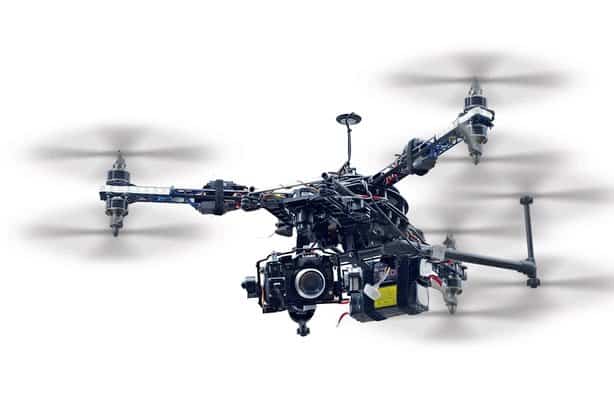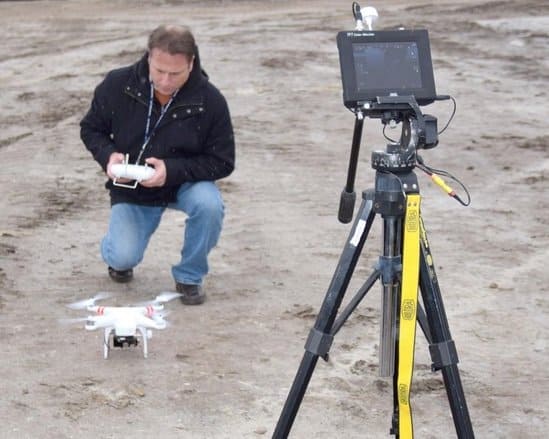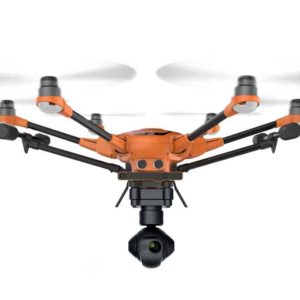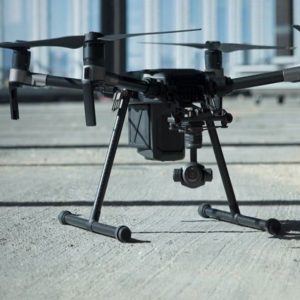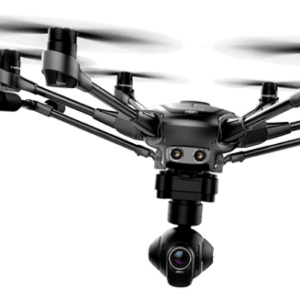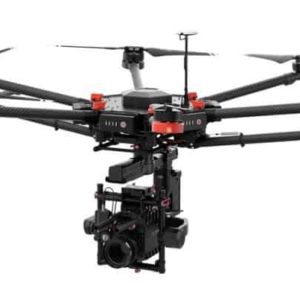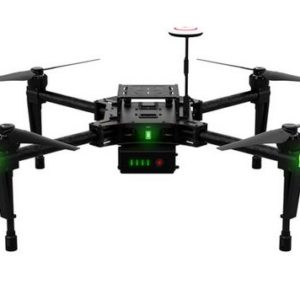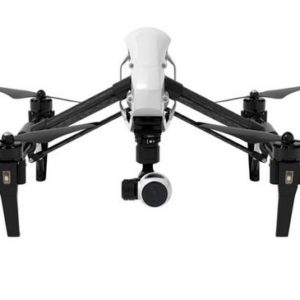Best Construction Drones & UAVs
These are the most popular and highest-rated camera drones and UAVs today for land surveying, construction site surveillance, and building inspection. Save time & money and produce more accurate bids.
Drone Construction Applications
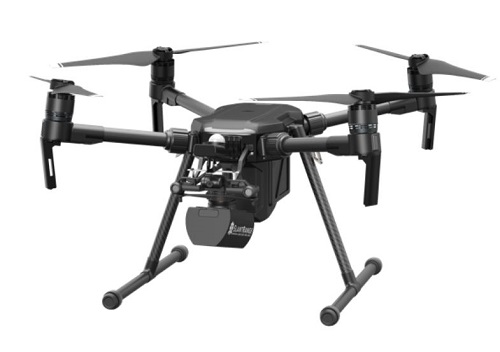
1. Data Collection
The main application of drones on construction sites is data collection. This includes detailed images and maps of the construction site.
This data is useful for construction managers and engineers who use the data to plan and make important decisions. For instance, a drone can map the topography of an area, helping engineers decide where to build roads and other amenities.
2. Carrying Payloads
High-end commercial drones like the DJI Matrice 200 allow customized payloads. You can attach different kinds of equipment and tools or specific tasks. For example, you can swap a standard camera for an infrared or thermal camera to collect additional data.
You can also attach other equipment such as lights and sensors like LIDAR.
Manufacturers are creating drones that carry more than tools and cameras. Soon, drones will be doing the heavy lifting in construction sites, carrying loads as heavy as 250kg. This will be particularly beneficial in harsh terrain like forests.
3. Progress Update
A drone is also an easy and quick way of checking the progress of a project. Instead of walking around the entire construction site, a drone can take up close and panoramic photos and videos in just a few minutes.
This is especially important for large construction projects. You can even live-stream the video on other devices so multiple teams can watch.
If you need to check a potentially dangerous area, it’s cheaper, faster, and safer to do it with a drone instead of people.
4. Maintenance
The utility of a drone doesn’t end when construction ends. Drones have become increasingly useful in maintaining different kinds of structures and facilities.
You can use a drone to check power lines, look for problems in outdoor ACs (using a thermal camera), and check inaccessible or hard to access areas like the roof.
Benefits of Drones in Construction
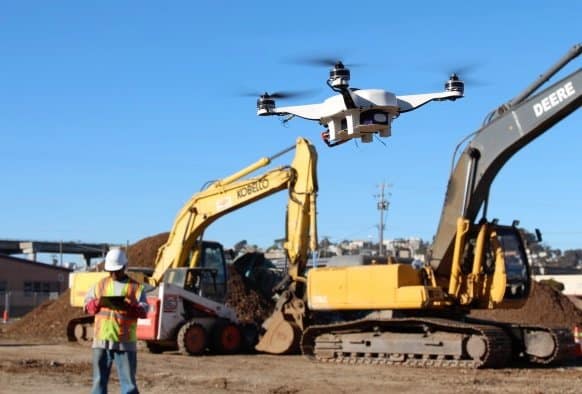
1. Wide range of options at different price points
Construction drones range from entry-level models that cost a couple of thousand bucks to advanced multipurpose models that can reach $10,000 or higher.
Whether you need a simple camera drone to update your client on the project’s progress or a high-end drone that can lift different payloads, there are plenty of options in the market. And not just from DJI, though we love their capable drones.
Many other companies offer customized drones, some that come bundled with software for things like mapping, data analysis, and other applications.
You can get a drone that fits your budget. A construction drone is going to cost you more than an ordinary hobby drone. You are looking at a starting price of around $2,000 for a basic camera drone.
If you want a capable and versatile drone, you can deploy various tasks around the construction site; you can spend up to $10,000 or more.
2. Cheaper than human labor
A drone will not replace all the workers at a construction site. But it can take over some tasks, saving you significant man-hours and labor costs.
For dangerous tasks, you also save money on liability insurance. It’s cheaper to insure a drone than several workers.
3. Fast and accurate
A data collection project that would have taken weeks can be completed in a few hours or days using a drone.
A drone can collect a lot of data, accurately and in a very short time. The reduced turnaround helps with faster decision making and can reduce cost and time overruns on a project.
4. Safer
As we’ve already pointed out, a drone can access hazardous areas where it would be dangerous to send a person.
5. Versatile
Your $2,000, $5,000, or $10,000 drone investment is not just good for getting cool pictures of a worksite.
Drones are versatile tools that can be used in a wide range of tasks. While imaging (photos and videos) is the most common application, you can also use a drone for mapping, security, payload transportation, and maintenance.
How to Choose the Right Drone for Your Worksite?
Here’s what to consider when you are buying a new drone for your construction worksite.
Camera
The camera is the most important aspect of the drone. Most of the data collection will be through the camera.
The first thing to consider is whether you want the ability to swap cameras. Cheaper drones have fixed cameras. For more money, you can get a drone with a removable camera.
Keep in mind, however, that the high-end drones typically don’t include a camera. So, in addition to the high price tag of the drone, you also have to budget for a compatible camera to go with it.
Whether you get a fixed camera drone or buy a camera separately, check the camera’s performance and capability.
Can it take a 4K video? Does it perform well in poor lighting? Does it have a zoom option?
Also, check if the camera offers a live stream option through the controller and external devices. Make sure the live video has a resolution of at least 720p.
Drone Type
You’ll need to choose between a fixed-wing and rotary-wing drone. For a construction worksite, a rotary-wing drone is the best choice.
The main limitation of a fixed-wing drone is that it needs to stay in forwarding motion all the time to generate lift. This means you cannot hover over an area to inspect a specific part or section of the construction.
A rotary-wing UAV, on the other hand, can hover in place, allowing extended inspections of a particular spot.
Another big advantage of a rotary-wing drone is its flexible maneuvering. It’s easier to fly a rotary-wing drone within tight spaces and complex turns, common in construction.
Fixed-wing drones are more ideal for applications that involve flying quickly over open areas such as spraying crops. But in construction, you’ll find a rotary to be more suited to your needs.
Drone Capability and Performance
If you are buying a drone that accepts custom payloads, check the payload capacity and compare it with the kind of equipment you plan to attach onto the drone.
Another thing to check, regardless of the drone type, is flight time. We recommend getting a drone that can stay in the air for at least 30 minutes. This gives you or your drone operator enough time to cover a large area.
Also, check if the drone has intelligent flight modes. Intelligent flight modes make it easier to capture the data you need without worrying about keeping the drone on the right flight path. For instance, DJI’s Point of Interest mode autonomously flies the drone around a particular point of focus.
Obstacle sensing and avoidance is also an important feature, considering all the obstacles that are in a construction site. A drone with obstacle sensors can fly safely in tighter spaces.
Don’t forget to check the drone’s max transmission range. A longer-range is helpful when working at a large construction site.
If you are working in rough environments, take a closer look at the drone specs to determine what wind speed it can withstand and whether it can work in extreme temperatures.
Software
Check if the drone comes with any kind of software. Because most enterprise drones are designed for general commercial applications, you won’t find one with software specifically for construction.
Instead, they come with general-purpose software for things like mapping, data analysis, and fleet management (useful if you are buying multiple drones).
For instance, some DJI drones come with FlightHub, a program for project coordination, data logging, team organization, and flight planning.
Also, check if the drone is compatible with additional third-party software. If it is, you can look for construction-specific software and integrate it with the drone.
Another thing to check is if the drone offers SDK support. SDK gives you the flexibility to create custom programs that fit your specific needs.
Portability
If you plan to use the drone in many locations, portability is important. Look for a compact and lightweight drone that can easily fit in a small case. If it’s foldable, that’s even better.
Note, however, that too much portability can compromise performance. So you need to decide the sweet point for you.
If you want a powerful, highly-capable drone, you’ll need to sacrifice portability. A powerful drone is going to be big and fairly heavy.
Parts and Accessories
Make sure that parts for the drone are easy to get from the manufacturer. If the manufacturer works through approved dealers, check that there’s one near you to ensure speedy repairs and reduce project delays.
Also, check what accessories the manufacturer offers, such as cameras, extra batteries, a battery charging hub, a carrying case, and other accessories.
Budget
Your budget will determine what kind of drone you can buy.
As I mentioned, you can expect to spend about $2,000 for an entry-level enterprise drone. It’ll have a high-resolution camera and extra features like obstacle detection, but you likely will not have the ability to add a custom payload.
Mid-range drones ($3,000-$6,000) are good enough for most construction applications. They have great light performance, and some accept custom payloads.
High-end drones can cost upwards of $7,000. The biggest advantage of such drones is their customizability in terms of the payload as well as software. These expensive drones also have a higher payload capacity, longer flight times, and can work in harsh environments.
As you decide how much to spend on a construction drone, don’t forget other associated costs. There are certain must-have accessories such as extra batteries, a battery charging station, and a carrying case.
You’ll also need insurance for the drone (liability and comprehensive). If you are not flying the drone yourself, you’ll need a licensed UAV pilot to operate it.
You may also need to pay for third party software for mapping, fleet management, and data analysis.
And if you are buying a drone with swappable cameras, you’ll likely need to buy the camera separately. A capable camera is pricey.
